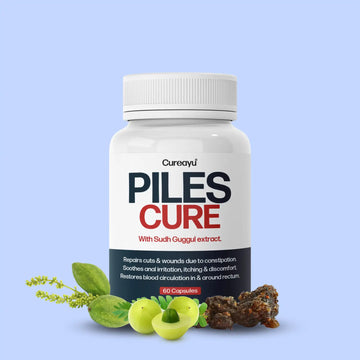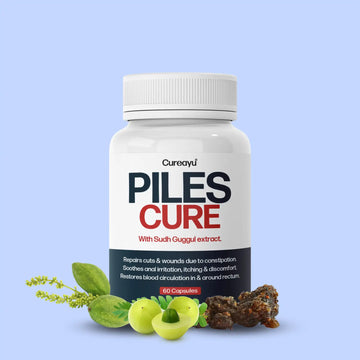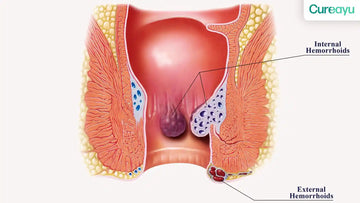Piles, also known as hemorrhoids, can be a painful and uncomfortable condition that affects millions of people worldwide. While there are various treatments available, one often overlooked aspect of managing piles is diet. The foods we consume play a crucial role in our digestive health and can significantly impact the severity and frequency of piles flare-ups.
In this comprehensive guide, we'll explore the foods that individuals suffering from piles should avoid to minimize discomfort and promote healing. By understanding the connection between diet and piles, you can make informed choices that will help alleviate symptoms and improve your overall quality of life.
Also Read: A Comprehensive Guide to Piles: Best Foods and Diet for Treatment
What Are Piles?
Piles, medically termed as hemorrhoids, are swollen veins in the lower part of the rectum and anus. These veins can become enlarged and irritated, causing discomfort, pain, and sometimes bleeding. Piles can be classified into two types: internal hemorrhoids, which occur inside the rectum, and external hemorrhoids, which develop under the skin around the anus.
Symptoms of piles may include itching, pain, swelling, and bleeding during bowel movements. In severe cases, they can protrude from the anus, causing significant discomfort. While piles are generally not life-threatening, they can significantly impact a person's quality of life and daily activities if left untreated.
Main Causes of Piles
Chronic Constipation
Chronic constipation is one of the primary causes of piles. When a person strains during bowel movements due to hard stools, it increases pressure on the veins in the anal area. This prolonged pressure can lead to the swelling and inflammation of these veins, resulting in hemorrhoids. Additionally, the act of straining can weaken the supporting tissues around the anal area, making it more susceptible to piles formation.
Pregnancy
Pregnancy is another common cause of piles, particularly during the third trimester. The growing uterus puts pressure on the pelvic veins, which can impede blood flow and cause the veins in the rectal area to enlarge. Hormonal changes during pregnancy can also contribute to the relaxation of vessel walls, making them more prone to swelling. Furthermore, the strain of childbirth can exacerbate existing hemorrhoids or cause new ones to form.
Obesity
Excess body weight can significantly increase the risk of developing piles. Obesity puts additional pressure on the veins in the pelvic and anal area, making them more susceptible to swelling and inflammation. Moreover, individuals who are overweight often lead sedentary lifestyles, which can contribute to poor circulation and increase the likelihood of constipation – both risk factors for piles.
Lack of Physical Activity
A sedentary lifestyle can contribute to the development of piles in several ways. Lack of physical activity can lead to poor circulation, which may cause blood to pool in the rectal veins, leading to swelling. Additionally, inactivity often correlates with a higher risk of obesity and constipation, both of which are known risk factors for piles. Regular exercise helps maintain healthy bowel movements and promotes overall circulatory health, reducing the risk of hemorrhoid formation.
Also Read: Don’t Ignore It: Being Aware of Piles
What Role Does Food Play In Piles?
Diet plays a crucial role in the management and prevention of piles. The foods we consume directly affect our digestive system, influencing factors such as stool consistency, bowel movement frequency, and overall gut health. A diet low in fiber and high in processed foods can lead to constipation, which is a primary cause of piles. Conversely, a balanced diet rich in fiber promotes regular bowel movements and reduces straining, helping to prevent and manage hemorrhoids.
Certain foods can also exacerbate inflammation in the body, potentially worsening piles symptoms. Spicy foods, for instance, can irritate the digestive tract and cause discomfort for those with hemorrhoids. Additionally, some foods can cause or worsen constipation, while others may have a laxative effect, potentially aggravating existing piles.
By being mindful of the foods we eat, we can significantly impact the health of our digestive system and reduce the risk of developing or worsening piles. A well-planned diet can help maintain soft stools, reduce inflammation, and promote overall gut health, all of which are essential in managing and preventing hemorrhoids.
Which Foods to Avoid In Piles
Spicy Foods
Spicy foods, while flavorful, can be problematic for individuals suffering from piles. These foods often contain capsaicin, a compound that can irritate the digestive tract and exacerbate inflammation in the anal area. Consuming spicy foods may lead to increased pain, burning sensations, and discomfort for those with hemorrhoids. Additionally, spicy foods can stimulate bowel movements, potentially causing further irritation to already sensitive tissues. It's advisable to limit or avoid spicy dishes, hot sauces, and peppers to minimize discomfort and promote healing.
Processed Foods
Processed foods are typically low in fiber and high in unhealthy fats and additives, making them a poor choice for individuals with piles. These foods can contribute to constipation, which is a major risk factor for hemorrhoids. The lack of fiber in processed foods can lead to harder stools, requiring more straining during bowel movements and potentially worsening existing piles. Furthermore, many processed foods contain artificial additives and preservatives that may cause inflammation in the body, potentially aggravating hemorrhoid symptoms. Opt for whole, unprocessed foods to support digestive health and manage piles effectively.
Dairy Products
Dairy products can be problematic for some individuals with piles, particularly those who are lactose intolerant. Consuming dairy when lactose intolerant can lead to digestive issues such as bloating, gas, and diarrhea, which may irritate hemorrhoids and cause discomfort. Additionally, some dairy products, especially those high in fat, can contribute to constipation in some people. If you notice that dairy products worsen your piles symptoms, consider reducing your intake or opting for lactose-free alternatives.
Alcoholic Beverages
Alcohol consumption can have several negative effects on individuals with piles. Firstly, alcohol can lead to dehydration, which may contribute to constipation and harder stools, exacerbating hemorrhoid symptoms. Secondly, alcohol can irritate the digestive tract and potentially worsen inflammation in the anal area. Moreover, excessive alcohol intake can impair liver function, which may affect overall digestive health. It's advisable to limit or avoid alcoholic beverages to manage piles effectively and promote healing.
Caffeinated Drinks
Caffeinated beverages, such as coffee, tea, and energy drinks, can be problematic for those with piles. Caffeine is a diuretic, meaning it can lead to dehydration if consumed in excess. Dehydration can contribute to constipation, making bowel movements more difficult and potentially aggravating hemorrhoids. Additionally, some caffeinated drinks, particularly coffee, can stimulate bowel movements, which may cause discomfort for those with sensitive hemorrhoids. While moderate caffeine consumption may be acceptable, it's best to limit intake and ensure adequate hydration to manage piles effectively.
Red Meat
Red meat consumption should be limited for individuals suffering from piles. Red meat is typically high in saturated fat and low in fiber, which can contribute to constipation and harder stools. This can lead to increased straining during bowel movements, potentially worsening hemorrhoid symptoms. Additionally, red meat can be harder to digest compared to plant-based proteins, potentially causing digestive discomfort. Opting for leaner protein sources and incorporating more plant-based meals can help manage piles and promote overall digestive health.
Also Read: बवासीर के लक्षण: बवासीर क्या है, कैसे होती है और इसके लक्षणों को समझें
Conclusion
Managing piles effectively involves a multifaceted approach, and diet plays a crucial role in this process. By avoiding foods that can exacerbate symptoms and opting for a balanced, fiber-rich diet, individuals can significantly reduce discomfort and promote healing. It's important to remember that while avoiding certain foods can help, it's equally important to focus on consuming foods that support digestive health, such as fruits, vegetables, whole grains, and lean proteins.
Every individual may react differently to certain foods, so it's essential to pay attention to your body and identify any personal triggers. If you're struggling with persistent or severe piles, it's advisable to consult with a healthcare professional for personalized advice and treatment options. By combining dietary modifications with other lifestyle changes and appropriate medical care, you can effectively manage piles and improve your overall quality of life. Remember, a healthy diet is not just about avoiding certain foods, but about creating a balanced, nutritious eating plan that supports your digestive health and overall well-being.












